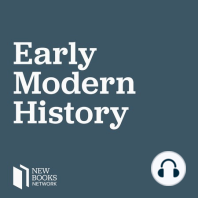71 min listen

Han F. Vermeulen, "Before Boas: The Genesis of Ethnography and Ethnology in the German Enlightenment" (U Nebraska Press, 2015)
Han F. Vermeulen, "Before Boas: The Genesis of Ethnography and Ethnology in the German Enlightenment" (U Nebraska Press, 2015)
ratings:
Length:
103 minutes
Released:
Nov 11, 2019
Format:
Podcast episode
Description
The history of anthropology has been written from multiple viewpoints, often from perspectives of gender, nationality, theory, or politics. Winner of the 2017 International Convention of Asia Scholars Book Prize, Before Boas: The Genesis of Ethnography and Ethnology in the German Enlightenment (University of Nebraska Press, 2015; paperback edition, 2018), delves deeper into issues concerning anthropology’s academic origins to present a groundbreaking study that reveals how ethnography and ethnology originated during the eighteenth rather than the nineteenth century, developing parallel to anthropology, or the “natural history of man.”
Han F. Vermeulen, alumnus of Leiden University and research associate at the Max Planck Institute for Social Anthropology in Halle, Germany, explores primary and secondary sources from Russia, Germany, Austria, the United States, the Netherlands, Hungary, the Czech Republic, Slovakia, France, and Great Britain in tracing how “ethnography” originated as field research by German-speaking historians and naturalists in Siberia (Russia) during the 1730s and 1740s, was generalized as “ethnology” by scholars in Göttingen (Germany) and Vienna (Austria) during the 1770s and 1780s, and was subsequently adopted by researchers in other countries. Before Boas argues that anthropology and ethnology were separate sciences during the Age of Reason, studying racial and ethnic diversity, respectively. Ethnography and ethnology focused not on “other” cultures but on all peoples of all eras. Following G. W. Leibniz, researchers in these fields categorized peoples primarily according to their languages. Franz Boas professionalized the holistic study of anthropology from the 1880s into the twentieth century.
Ryan Tripp is part-time and full-time adjunct history faculty for Los Medanos Community College as well as the College of Online and Continuing Education at Southern New Hampshire University.
Learn more about your ad choices. Visit megaphone.fm/adchoices
Han F. Vermeulen, alumnus of Leiden University and research associate at the Max Planck Institute for Social Anthropology in Halle, Germany, explores primary and secondary sources from Russia, Germany, Austria, the United States, the Netherlands, Hungary, the Czech Republic, Slovakia, France, and Great Britain in tracing how “ethnography” originated as field research by German-speaking historians and naturalists in Siberia (Russia) during the 1730s and 1740s, was generalized as “ethnology” by scholars in Göttingen (Germany) and Vienna (Austria) during the 1770s and 1780s, and was subsequently adopted by researchers in other countries. Before Boas argues that anthropology and ethnology were separate sciences during the Age of Reason, studying racial and ethnic diversity, respectively. Ethnography and ethnology focused not on “other” cultures but on all peoples of all eras. Following G. W. Leibniz, researchers in these fields categorized peoples primarily according to their languages. Franz Boas professionalized the holistic study of anthropology from the 1880s into the twentieth century.
Ryan Tripp is part-time and full-time adjunct history faculty for Los Medanos Community College as well as the College of Online and Continuing Education at Southern New Hampshire University.
Learn more about your ad choices. Visit megaphone.fm/adchoices
Released:
Nov 11, 2019
Format:
Podcast episode
Titles in the series (100)
Robert Westman, “The Copernican Question: Prognostication, Skepticism, and Celestial Order” (University of California Press, 2011): This is an extraordinary book written by one of the finest historians of science. Ringing in at nearly seven hundred oversized, double columned pages Robert Westman‘s The Copernican Question: Prognostication, Skepticism, by New Books in Early Modern History